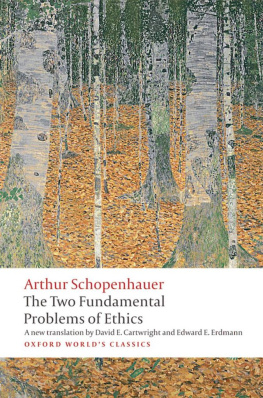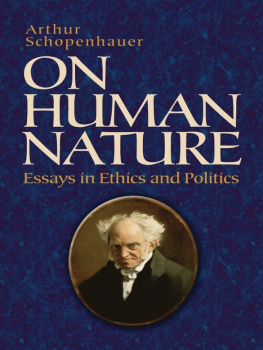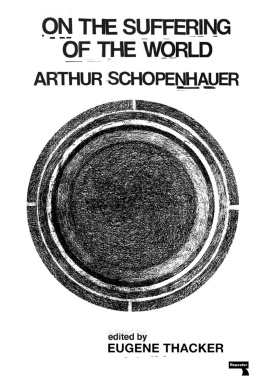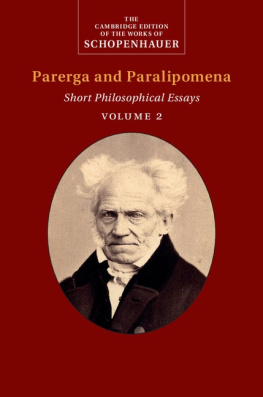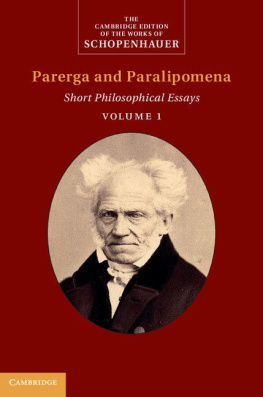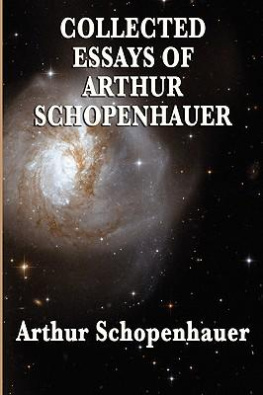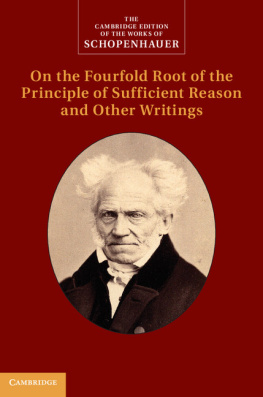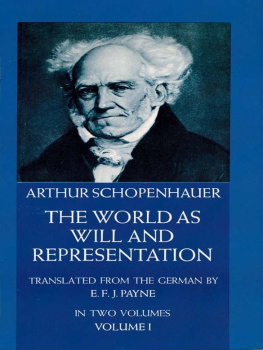Schopenhauer Arthur - Arthur Schopenhauer: The World as Will and Presentation
Here you can read online Schopenhauer Arthur - Arthur Schopenhauer: The World as Will and Presentation full text of the book (entire story) in english for free. Download pdf and epub, get meaning, cover and reviews about this ebook. publisher: Taylor & Francis Group, genre: Religion. Description of the work, (preface) as well as reviews are available. Best literature library LitArk.com created for fans of good reading and offers a wide selection of genres:
Romance novel
Science fiction
Adventure
Detective
Science
History
Home and family
Prose
Art
Politics
Computer
Non-fiction
Religion
Business
Children
Humor
Choose a favorite category and find really read worthwhile books. Enjoy immersion in the world of imagination, feel the emotions of the characters or learn something new for yourself, make an fascinating discovery.
- Book:Arthur Schopenhauer: The World as Will and Presentation
- Author:
- Publisher:Taylor & Francis Group
- Genre:
- Rating:4 / 5
- Favourites:Add to favourites
- Your mark:
- 80
- 1
- 2
- 3
- 4
- 5
Arthur Schopenhauer: The World as Will and Presentation: summary, description and annotation
We offer to read an annotation, description, summary or preface (depends on what the author of the book "Arthur Schopenhauer: The World as Will and Presentation" wrote himself). If you haven't found the necessary information about the book — write in the comments, we will try to find it.
Schopenhauer Arthur: author's other books
Who wrote Arthur Schopenhauer: The World as Will and Presentation? Find out the surname, the name of the author of the book and a list of all author's works by series.
Arthur Schopenhauer: The World as Will and Presentation — read online for free the complete book (whole text) full work
Below is the text of the book, divided by pages. System saving the place of the last page read, allows you to conveniently read the book "Arthur Schopenhauer: The World as Will and Presentation" online for free, without having to search again every time where you left off. Put a bookmark, and you can go to the page where you finished reading at any time.
Font size:
Interval:
Bookmark:
DANIEL KOLAK, SERIES EDITOR
Arthur Schopenhauer
The World as Will and Presentation

Volume Two
TRANSLATED BY
DAVID CARUS
and
RICHARD E. AQUILA
THE UNIVERSITY OF TENNESSEE

2 Park Square, Milton Park, Abingdon, Oxon OX14 4RN
711 Third Avenue, New York, NY, 10017, USA
Product or corporate names may be trademarks or registered trademarks, and are used only for identification and explanation without intent to infringe.

Contents

We are pleased to add this volume to our translation of the first of Arthur Schopenhauers Die Welt als Wille und Vorstellung, to which the author himself had added it in a second edition, with some revision of the original, as a volume of supplements (Ergnzungen). Regarding the upshotin which it pleases me first of all to find nothing to have to retract after twenty-five years:
if the first half of my work has that advantage over the second which only the fire of youth and the energy of initial conception can bestow, the latter, by contrast, will surpass the former through its maturity and completeness in working out thoughts, which is imparted only to the fruits of a long course of life and its industry.
Accordingly:
although it would of course have to have been more pleasant for the reader to have my work as a whole from a single mold, instead of its now consisting of two halves that need to be brought together in use, I wish that he consider the fact that it would have been required for this that I had accomplished at a single stage of life what is possible only in two On the other hand, however, the reader will find some compensation for the inconvenience of the simultaneous employment of two volumes in the variety and relief entailed by treatment of the same subject, by the same mind, in the same spirit, but in very different years.
As for how the two volumes should actually be brought together in use, Schopenhauer then offers the following advice:
[F]or someone who is not yet familiar with my philosophy, it is altogether advisable to read the first volume from the start without bringing in the supplements Even someone who should fail to decide upon a second reading of the first volume will do better to read the second only after it and for itself, in the straight sequence of its chapters, which of course stand in an (albeit looser) interconnection with one another; its gaps will be completely filled for him by his recollection of the first volume, if he has understood it well.
We therefore assume that readers of the present volume will be in possession of the first, and simply refer to our Introduction to the latter for some comments and suggestions regarding interpretation of the work as a whole, as well as for discussion of some general issues of translation. But for the convenience of the reader, we repeat some of the more technical details regarding the text and our procedures here, along with additional points specific to the present volume.
The present translation is based on the text of the third (1859) edition of Volume Two of Die Welt als Wille und Vorstellung, as edited by Arthur Hbscher and contained in vol. 3 of his edition of Schopenhauers works.selective information regarding variations between the second and third editions (cited, as is standard, as B and C, respectively), that is, between the two editions containing the second volume as published by Schopenhauer himself, as well as regarding handwritten additions (Zustze) made by Schopenhauer to his personal copies of the work with an apparent eye to a further edition. In the latter case, however, we do not bother to note Zustze to B that are subsequently incorporated into C; we simply note the change as between the two editions. With respect to Zustze to C, we generally follow Hbscher, who in turn generally follows Frauendstdt, in incorporating them into the text, but with clear annotation to that effect. In addition, following Hbscher, we provide information regarding variation with respect to the extant manuscript for B, from 1843, thus regarding last-minute changes.
In general, we provide this information in endnotes. However, where a footnote is attached for an independent reason, we include the information at that point, rather than adding an endnote as well. Again, we have been selective. In general, we omit changes that seem to us to be of no substantive import (e.g., changes in spelling, or to merely stylistic effect) and additions or revisions to citations of Schopenhauers own works, or editions of his works, where the cited material had appeared between the B and C editions, and so could not possibly have been cited earlier. (We also remind the reader only periodically that the Latin translations of Greek quotations were all added by Schopenhauer in C.)
The information regarding these variations has been derived primarily from the notes appended to the third volume of Hbschers edition of the Smtliche Werke, and from pp. 113120 and pp. 148152 of the seventh volume. In addition, we have greatly benefited from the edition of Paul Deussen,
Two types of footnotes are employed. Those that are designated with daggers (, ) are Schopenhauers. Those that are designated numerically in lowercase roman (i, ii, iii), and enclosed in brackets ([]), are ours. The latter are employed mainly for two purposes: to inform the reader as to some bit of the German text, and for the provision of information regarding Schopenhauers citations and references. Bracketed material is also occasionally introduced into Schopenhauers own footnotes, for the filling out of citations, translations from other languages, and so on. The endnotes are ours, generally containing information regarding variations as between, and
Next pageFont size:
Interval:
Bookmark:
Similar books «Arthur Schopenhauer: The World as Will and Presentation»
Look at similar books to Arthur Schopenhauer: The World as Will and Presentation. We have selected literature similar in name and meaning in the hope of providing readers with more options to find new, interesting, not yet read works.
Discussion, reviews of the book Arthur Schopenhauer: The World as Will and Presentation and just readers' own opinions. Leave your comments, write what you think about the work, its meaning or the main characters. Specify what exactly you liked and what you didn't like, and why you think so.


